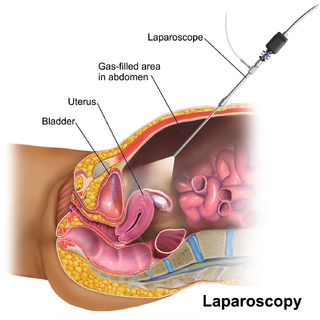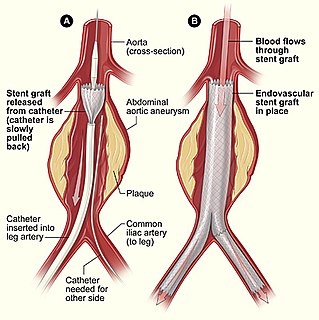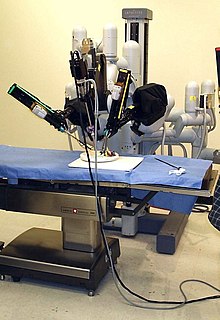
General surgery is a surgical specialty that focuses on abdominal contents including esophagus, stomach, small intestine, large intestine, liver, pancreas, gallbladder, appendix and bile ducts, and often the thyroid gland. They also deal with diseases involving the skin, breast, soft tissue, trauma, Peripheral artery disease and hernias and perform endoscopic procedures such as gastroscopy and colonoscopy.

Laparoscopy is an operation performed in the abdomen or pelvis using small incisions with the aid of a camera. The laparoscope aids diagnosis or therapeutic interventions with a few small cuts in the abdomen.

An appendectomy, also termed appendicectomy, is a surgical operation in which the vermiform appendix is removed. Appendectomy is normally performed as an urgent or emergency procedure to treat complicated acute appendicitis.

Gastric bypass surgery refers to a surgical process in which the stomach is divided into a small upper pouch and a much larger lower "remnant" pouch and then the small intestine is rearranged to connect to both. Surgeons have developed several different ways to reconnect the intestine, thus leading to several different gastric bypass procedures (GBP). Any GBP leads to a marked reduction in the functional volume of the stomach, accompanied by an altered physiological and physical response to food.

Minimally invasive procedures encompass surgical techniques that limit the size of incisions needed and so lessen wound healing time, associated pain and risk of infection. Surgery by definition is invasive and many operations requiring incisions of some size are referred to as open surgery, in which incisions made can sometimes leave large wounds that are painful and take a long time to heal. Minimally invasive procedures have been enabled by the advance of various medical technologies. An endovascular aneurysm repair as an example of minimally invasive surgery is much less invasive in that it involves much smaller incisions than the corresponding open surgery procedure of open aortic surgery. This minimally invasive surgery became the most common method of repairing abdominal aortic aneurysms in 2003 in the United States.

Common bile duct stone, also known as choledocholithiasis, is the presence of gallstones in the common bile duct (CBD). This condition can cause jaundice and liver cell damage. Treatment is by choledocholithotomy and endoscopic retrograde cholangiopancreatography (ERCP).

A laparoscopic adjustable gastric band, commonly called a lap-band, A band, or LAGB, is an inflatable silicone device placed around the top portion of the stomach to treat obesity, intended to decrease food consumption.

Robotic surgery are types of surgical procedures that are done using robotic systems. Robotically-assisted surgery was developed to try to overcome the limitations of pre-existing minimally-invasive surgical procedures and to enhance the capabilities of surgeons performing open surgery.
Marc Bessler, M.D. is an American surgeon known for his innovations in bariatrics. He is currently the United States Surgical Professor of Surgery at Columbia University Medical Center and also serves as a content contributor for Bariatric Surgery Source. Dr. Bessler specializes in surgical management of morbid obesity and laparoscopic surgery of the stomach, among other specialties.

Sleeve gastrectomy is a surgical weight-loss procedure in which the stomach is reduced to about 15% of its original size, by surgical removal of a large portion of the stomach along the greater curvature. The result is a sleeve or tube like structure. The procedure permanently reduces the size of the stomach, although there could be some dilatation of the stomach later on in life. The procedure is generally performed laparoscopically and is irreversible.

Camran Nezhat, FACOG, FACS is a laparoscopic surgeon, reproductive endocrinology and infertility sub-specialist who has been teaching and practicing medicine and surgery as an adjunct clinical professor of surgery, and obstetrics and gynecology at Stanford University Medical Center in Palo Alto, California since 1993. Nezhat is also Chair of the Association of the Adjunct Clinical Faculty, Stanford University School of Medicine, and a Clinical Professor of OB/GYN at the University of California, San Francisco.
Single-port laparoscopy (SPL), is a recently developed technique in laparoscopic surgery. It is a minimally invasive surgical procedure in which the surgeon operates almost exclusively through a single entry point, typically the patient's navel. Unlike a traditional multi-port laparoscopic approach, SPL leaves only a single small scar.
Single-incision laparoscopic surgery (SILS) is an advanced, minimally invasive (keyhole) procedure in which the surgeon operates almost exclusively through a single entry point, typically the patient's umbilicus (navel). Special articulating instruments and access ports eliminate the need to place trochars externally for triangulation, thus allowing the creation of a small, solitary portal of entry into the abdomen.
The Society of American Gastrointestinal and Endoscopic Surgeons (SAGES) is a 501c6 non-profit professional organization providing education on gastrointestinal minimally invasive surgery. It describes itself thus: The mission of the Society of American Gastrointestinal and Endoscopic Surgeons is to improve quality patient care through education, research, innovation and leadership, principally in gastrointestinal and endoscopic surgery.
Saumitra Rawat is an Indian surgical gastroenterologist and the head of Surgical Gastroenterology and Liver Transplant at Sir Ganga Ram Hospital, New Delhi. The Government of India honoured him in 2015 with the award of Padma Shri.
Dr Antonio M. de Lacy Fortuny is a Spanish doctor. He is Head of the Gastrointestinal Surgery Service and Chief of the Minimally Invasive Surgery Department at the Hospital Clínic, Barcelona (Spain).
Kurt Karl Stephan Semm was a German gynecologist and pioneer in minimally invasive surgery. He has been called "the father of modern laparoscopy".
Ileal Interposition is a Metabolic Surgery procedure, used to treat overweight diabetic patients through surgical means. First presented by the Brazilian surgeon Aureo De Paula in 1999, this technique is applied by placing ileum, which is the distal part of the small intestine, either between stomach and the proximal part of the small intestine (1) or by placing the ileum to the proximal part of the small intestine without touching the natural connections of the stomach (2). There are 2 different versions of the operation. Sleeve gastrectomy procedure is standard for both of the versions.

Pradeep Kumar Chowbey is an Indian surgeon, known for laparoscopic and bariatric surgeries. He is the incumbent Executive vice chairman of the Max Healthcare, Chairman of the Minimal Access, Metabolic & Bariatric Surgery and Allied Surgical Specialities of the Max Healthcare Institute, New Delhi. He is the founder of the Minimal Access, Metabolic & Bariatric Surgery Centre at the Sir Ganga Ram Hospital, New Delhi and has served as the Honorary Surgeon to the President of India, Dalai Lama and the Indian Armed Forces (AFMS). The Government of India awarded him the fourth highest civilian honour of the Padma Shri in 2002.
Sir Alfred Cuschieri is a Maltese-British academic and surgeon. He is most notable for his pioneering contribution to the development and clinical implementation of minimal access surgery, also known as key-hole surgery. He has been Professor of Surgery at the Scuola Superiore Sant’Anna since 2003 as well as Chief Scientific Advisor to the Institute of Medical Science and Technology at the University of Dundee since 2008.








